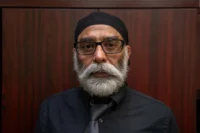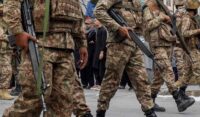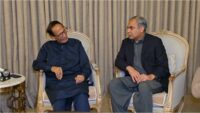This article is written by Major (r) Haroon Rasheed.
For decades, Israel has maintained a policy of nuclear ambiguity—neither confirming nor denying the existence of its nuclear arsenal. While never officially acknowledged, it is widely accepted among global security analysts and intelligence agencies that Israel is one of the world’s nuclear powers. This opacity, carefully preserved with the support of the United States, has allowed Israel to avoid both international scrutiny and disarmament obligations under the Nuclear Non-Proliferation Treaty (NPT), which it has never signed.
Trump–Asim Munir Meeting: The Strategic Earthquake Modi Never Saw Coming
Growing Oil Prices and Their Impact on Pakistan’s Economy
Operation Banyan-um-Marsoos victory of peace: DG ISPR
For more such Opinions & Blogs, click here.
Origins of the Program: A Pre-State Vision
Israel’s interest in nuclear weapons predates its formal establishment in 1948. According to various historical records, Israeli leaders and scientists began exploring the potential of atomic energy in the early 1940s. By 1958, construction began on a secret nuclear facility near Dimona, in the Negev Desert, with assistance from France under the guise of a “research reactor.”
This facility, known publicly as the Negev Nuclear Research Center, would become the heart of Israel’s nuclear weapons development program.
Nuclear Capability Confirmed, But Never Admitted
By 1966 or 1967, it is believed that Israel had successfully assembled its first nuclear weapon—just in time for the Six-Day War. A 1968 CIA report confirmed that Israel had begun production of nuclear weapons, making it the sixth nation in the world to acquire them, after the United States, Soviet Union, United Kingdom, France, and China.
In 1979, satellite data and atmospheric tests suggested that Israel may have conducted a clandestine nuclear test in the Indian Ocean, possibly in collaboration with apartheid-era South Africa. Though officially denied, many intelligence agencies and researchers believe this event, known as the Vela Incident, was a nuclear detonation.
WB Country Director calls on PM in Islamabad
Shandur Polo Festival to begin in Upper Chitral from tomorrow
Death anniversary of Ustad Barkat Ali Khan being observed today
Size and Scope of Israel’s Nuclear Arsenal
While Israel has never published figures or allowed international inspections, independent assessments estimate that the country possesses around 90 nuclear warheads. According to the Nuclear Threat Initiative (NTI) and the Stockholm International Peace Research Institute (SIPRI), Israel also holds enough fissile material—mainly plutonium—to build up to 300 nuclear weapons if needed.
Modernization and Delivery Systems
Israel continues to modernize its nuclear weapons infrastructure. In 2024, Israel reportedly tested a missile propulsion system, possibly linked to its Jericho-series ballistic missiles—long-range, nuclear-capable delivery platforms capable of reaching targets across the Middle East and beyond.
Additionally, satellite imagery and analysis from arms control experts show ongoing upgrades at the Dimona facility, including the expansion of its plutonium production reactor. This suggests a long-term strategy to maintain and enhance nuclear capabilities.
Israel’s delivery systems likely include
- Jericho II and Jericho III missiles with ranges of up to 5,000 km,
- Submarine-launched cruise missiles (SLCMs), providing a second-strike capability,
- Possibly even air-dropped gravity bombs deployed from fighter jets such as F-15s and F-35s.
Air India ‘Black Box’ Damaged, May Have To Be Sent Abroad
Those Who Speak English In India Will Soon Feel Ashamed: Amit Shah
Trump privately approved attack plans for Iran but withheld final order
Why Israel Maintains Ambiguity
Israel’s “policy of opacity” (Amimut) allows it to enjoy the strategic benefits of nuclear deterrence without inviting the political and diplomatic costs that come with formal acknowledgment. By not declaring its arsenal, Israel avoids triggering regional arms races or diplomatic confrontations, particularly with allies like the United States and European Union countries.
Furthermore, Israel uses its nuclear deterrent as a last-resort safeguard—sometimes referred to as the “Samson Option”—in case of an existential threat to the state.
Global Implications and Regional Tensions
Israel’s undeclared nuclear arsenal has long been a point of contention in the Middle East. Countries like Iran, which openly opposes Israel’s existence, have cited Israel’s nuclear weapons as a justification for their own nuclear ambitions.
Despite being outside the NPT, Israel receives minimal international pressure compared to Iran or North Korea—highlighting the double standards in global nuclear governance.
Conclusion
Israel’s nuclear weapons program is no longer a secret, but it remains one of the most tightly controlled and least discussed issues in international security. As tensions rise in the Middle East, and as more nations develop advanced missile and drone capabilities, Israel’s opaque yet powerful nuclear deterrent will continue to shape the strategic balance of the region—and the policies of the world’s major powers.
For more such Opinions & Blogs, click here.
Big explosion rocks Elon Musk’s SpaceX base during Starship testing
Iran’s missile strikes damage Israeli stock exchange building
Trump hosts Pakistani army chief; disagrees with India over India-Pakistan war mediation
India is a perpetrator of foreign interference, Canadian intelligence agency says
Love Pakistan, stopped war with India: Trump
This article is written by Major (r) Haroon Rasheed.
Stay tuned to Baaghi TV for more. Download our app for the latest news, updates & interesting content!






